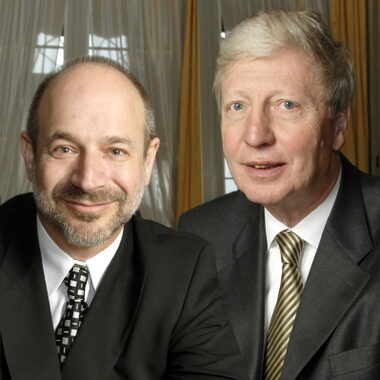Interview avec Bruce Beutler 11.06.2009 (anglais)
États-Unis et France/Luxembourg
Bruce Beutler et Jules Hoffmann
Prix Balzan 2007 pour l'immunité innée
Pour leur découverte des mécanismes génétiques responsables de l’immunité innée. Ils ont collaboré étroitement à l’élaboration d’une vision nouvelle des mécanismes moléculaires de défense que les organismes, des plus primitifs aux plus évolués, opposent aux agents infectieux. Leurs travaux débouchent sur des applications médicales très prometteuses
Bruce Beutler, 2007 Balzan Prizewinner, is Chairman of the Department of Genetics at The Scripps Research Institute in La Jolla, California; together with two colleagues in immunology, Ralph Steinman and Charles Dinarello, he was recently awarded the Albany Medical Center prize for his work in innate immunity. In the words of James J. Barba (president and chief executive officer of Albany Medical Center, as well as chairman of the National Selection Committee) in a press release in April, « Collectively, the work of these scientists has led to a dramatically better understanding of the human immune system, in health and in disease. The discoveries they have made about how the body senses and responds to infection remain the basis of active research that holds the promise of new and improved vaccines and innovative ways to harness the power of the immune system to better fight viruses and bacterial illness. Their achievements are nothing short of astounding. »
In 2007, Professor Beutler won the Balzan prize together with French scientist Jules Hoffman for their work on innate immunity. Beutler has done his work primarily on mice, while his co-prize winner Jules Hoffman has worked extensively on flies.
Balzan spoke with Beutler in a recent telephone interview about how he is using the Balzan funds for his latest research project in immunology.
According to Beutler, he has made two significant discoveries during his career. He discovered that tumor necrosis factor (TNF), a cytokine, was inflammatory and one of the hallmarks of infection while the second discovery was to understand the function of toll-like receptors or TLRs. The implications of his discoveries are vast. «TLRs can be described as the eyes of the immune system which detect infection and they direct the process of inflammation which helps to contain infection. But they sometimes signal excessively, and cause us harm», Beutler said. «By understanding that TLRs are the ultimate source of inflammation in acute and chronic inflammatory diseases, one can eventually create drugs that prevent TLR signaling and thereby treat some diseases», he added.
Beutler and his team have begun to create a mutagenesis pipeline in order to understand which mutations in mice are lethal as a result of TLR signaling. Mutations affect the structure of proteins: molecules that make up much of our body mass, existing in more than 20,000 varieties in both humans and mice. Each protein is made up of a unique string of amino acids folded into a particular shape. Often, a mutation may cause proteins to assume an unusual fold or shape. If the abnormal shape is just right, the mutation could instigate a reaction by the TLRs which might perceive the protein as “foreign” and initiate an immune response. Autoimmune conditions are essentially created when the body attacks itself. What Beutler’s team is looking for is to isolate mutations that cause the TLRs to react and then learn how to prevent them from reacting.
According to Beutler, «If we can come up with ways to block the TLR from reacting, this would be a major step forward. The mutations that are mapped and the response of the TLRs will give the team an idea of what the reaction would be like in a human being. We are at the beginning of our work, which could take years, but we have had clear success with mutating mice. We need to see if there is any substance to our hypothesis».
In terms of future trends in immunology, Beutler expects that researchers will work towards understanding our bodies’ reactivity to our own tissues, which thus far is only understood in part, thanks to his discovery of TLRs. «We are still working to understand the genetic basis for the preponderance of mutations that cause autoimmunity and to understand how they cause it. Autoimmune diseases occur when our immune system acts as if our tissues were a foreign body. We do not yet have all the details. These are the issues that researchers will be trying to understand».
There are a host of autoimmune diseases that will potentially benefit from this research, including Rheumatoid Arthritis, Lupus, Crohn’s Disease, Type 1 Diabetes, Multiple Sclerosis and many others. If the causal mutations can be effectively tracked down, perhaps one day scientists will be able to create precise drugs to block the primary events that cause autoimmune diseases. «That day is clearly not around the corner but that is the desired result», Beutler added. A drug for rheumatoid arthritis, Enbrel, has already been created thanks to Beutler’s work on blocking TNF in order to reduce inflammation.
